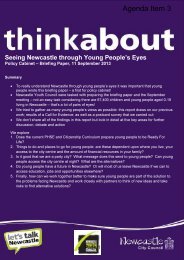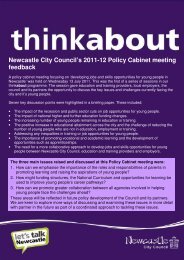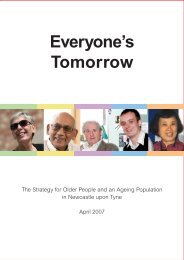NEWCASTLE'S MUSICAL HERITAGE AN INTRODUCTION By ...
NEWCASTLE'S MUSICAL HERITAGE AN INTRODUCTION By ...
NEWCASTLE'S MUSICAL HERITAGE AN INTRODUCTION By ...
Create successful ePaper yourself
Turn your PDF publications into a flip-book with our unique Google optimized e-Paper software.
the soprano parts and reflected a social acceptance of women into choral clubs<br />
and singing groups of the day, which had been exclusively male dominated.<br />
There is no record that I can trace of any glee club in Newcastle in the 1700s, but<br />
I think we can accept that there must have been a Glee Club as they continued<br />
meeting through the 19 th and 20 th centuries and so far as I know may still be<br />
harmonising their way through the 21 st .<br />
Further down the artistic and social scale, but at the very core of Newcastle’s<br />
musical heritage, are the Tyneside songs that are as much alive today as they<br />
were centuries ago. The North East or Northumbria was unique in that it had a<br />
corpus of folksongs, pipe tunes and sword dances that were not found elsewhere<br />
in Britain. There were distinct racial factors that set Northumberland apart from<br />
the rest of the country and gave it a unique identity in its music of the people in<br />
its various forms No less an authority than Dr W.G. Whittaker (1876-1944)<br />
strongly affirmed the singularity of Northumbria as being neither English nor<br />
Scottish but both and neither. The early songs reflected the hardships and<br />
deprivations of working class life and one of the earliest, ‘Come you not from<br />
Newcastle’, can be traced back to the time of Queen Elizabeth I. Other<br />
contemporary dialect songs reflected aspects of the poorer people’s lives. ‘The<br />
Keel Row’ was popular as long ago as 1760. Later songs celebrated popular<br />
sports such as horse racing, prize fighting and rowing and a song called, ‘The<br />
Toon Improvement Bill’ lamented the loss of playing space which resulted from<br />
the building of the Central Station. Newcastle being a port gave rise to songs<br />
about the Press Gangs, which officially ceased in 1815 but were still active in<br />
Newcastle as late as 1839. Captain John Bover, who seems to have been feared<br />
in this respect has a memorial tablet in the Cathedral. A local verse, in answer to<br />
the question, ‘Where es ti been, maw canny hinny addressed to a sailor,<br />
included the lines ‘Aw’ve been ti the norrard, Cruising back and forrard, But<br />
daurna come ashore – For Bover and his gang’. On a sadder note a song of<br />
around 1842 reflects the feelings of those who saw their friends sentenced to<br />
fifteen years penal servitude by a judge on the Northern Circuit for stealing;-<br />
‘Oh! ‘tis a cruel sentence for a man to leave his wife,<br />
His children, and his dearest friends, all dearer than his life;<br />
To leave the land that gave him birth, to see it p’haps no more,<br />
And drag a wretched life in chains, upon a distant shore.<br />
The rich have no temptations, they have all things at command<br />
And ‘tis for pleasure and for health, they leave their native land;<br />
But a starving wife and family, makes a poor man’s heart to break,<br />
And makes him do what brings a blush of shame upon his cheek.’<br />
The audience for these songs would not have been receptive to high art, which<br />
was shown when Paganini (1782-1840) the virtuoso violinist, made a tour of the<br />
North East and the following was written;-<br />
“Hats off, smash your brains, here comes greet Baggy Nanny”<br />
26

















